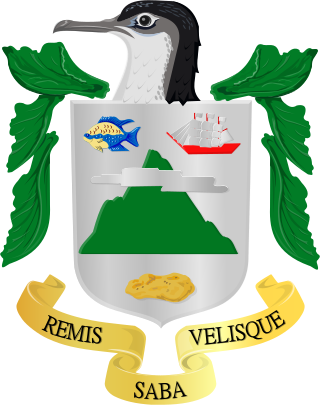 |
|---|
|
A status referendum was held on the island of Sint Eustatius on 14 October 1994, alongside simultaneous referendums on Bonaire, Saba and Sint Maarten. [1] A majority voted for maintaining the status quo.
 |
|---|
|
A status referendum was held on the island of Sint Eustatius on 14 October 1994, alongside simultaneous referendums on Bonaire, Saba and Sint Maarten. [1] A majority voted for maintaining the status quo.
| Choice | Votes | % |
|---|---|---|
| Status quo | 90.7 | |
| Autonomy | 6.8 | |
| Integration with the Netherlands | 2.3 | |
| Independence | 0.2 | |
| Invalid/blank votes | – | |
| Total | 100 | |
| Registered voters/turnout | 44.0 | |
| Source: Direct Democracy | ||

The Netherlands Antilles, also known as the Dutch Antilles, was a constituent Caribbean country of the Kingdom of the Netherlands consisting of the islands of Saba, Sint Eustatius, and Sint Maarten in the Lesser Antilles, and Aruba, Curaçao, and Bonaire in the Leeward Antilles. The country came into being in 1954 as the autonomous successor of the Dutch colony of Curaçao and Dependencies, and it was dissolved in 2010, when like Aruba in 1986, Sint Maarten and Curaçao gained status of constituent countries within the Kingdom of the Netherlands, and Saba, Sint Eustatius, and Bonaire gained status of special municipality of Netherlands as the Caribbean Netherlands. The neighboring Dutch colony of Surinam in continental South America, did not become part of the Netherlands Antilles but became a separate autonomous country in 1954. All the territories that belonged to the Netherlands Antilles remain part of the kingdom today, although the legal status of each differs. As a group they are still commonly called the Dutch Caribbean, regardless of their legal status. People from this former territory continue to be called Antilleans in the Netherlands.

The flag of the Netherlands Antilles was white, with a horizontal blue stripe in the center, one-third of the flag's hoist, superimposed on a vertical red stripe of the same width, also centered; six white, five-pointed stars are arranged in a hexagon pattern in the center of the blue band, their points up. It was adopted on 19 November 1959.

The SSS islands, locally also known as the Windward Islands, is a collective term for the three territories of the Dutch Caribbean that are located within the Leeward Islands group of the Lesser Antilles in the Caribbean Sea. In order of population size, they are: Sint Maarten, Sint Eustatius, and Saba. In some contexts, the term is also used to refer to the entire island of Saint Martin, alongside Sint Eustatius and Saba.
Elections in the Netherlands Antilles were held for two territorial levels of government: the state, and the island territories.
Same-sex marriage is legal in Aruba and Curaçao, two constituent countries of the Kingdom of the Netherlands, in accordance with a ruling from the Supreme Court of the Netherlands issued on 12 July 2024. In September 2021, a lower court in Curaçao ruled that preventing same-sex couples from marrying violates the equality provisions of the Constitution of Curaçao, but left the decision of whether to legalise same-sex marriage up to the Parliament. In December 2022, the Joint Court of Justice of Aruba, Curaçao, Sint Maarten, and of Bonaire, Sint Eustatius and Saba ruled on appeal that Aruba's and Curaçao's same-sex marriage bans were unconstitutional. The court order was set to go into effect on 7 March 2023 if not appealed to the Supreme Court; however, the governments of both Curaçao and Aruba subsequently appealed. On 12 July 2024, the Supreme Court upheld the lower court ruling, effectively legalizing same-sex marriage in Aruba and Curaçao with immediate effect.

The Netherlands Antilles was an autonomous Caribbean country within the Kingdom of the Netherlands. It was dissolved on 10 October 2010.
The country code 599 was assigned to the Netherlands Antilles, and is in use by Curaçao and the Caribbean Netherlands.

The Kingdom of the Netherlands, commonly known simply as the Netherlands, is a sovereign state consisting of a collection of constituent territories united under the monarch of the Netherlands, who functions as head of state. The realm is not a federation; it is a unitary monarchy with its largest subdivision, the eponymous Netherlands, predominantly located in Northwestern Europe and with several smaller island territories located in the Caribbean.

The Caribbean Netherlands is a geographic region of the Netherlands located outside of Europe, in the Caribbean, consisting of three special municipalities. These are the islands of Bonaire, Sint Eustatius, and Saba, as they are also known in legislation, or the BES islands for short. The islands are officially classified as public bodies in the Netherlands and as overseas territories of the European Union; as such, European Union law does not automatically apply to them.

A common visa exists since the end of 2010 for the territories of Aruba, Curaçao, Sint Maarten and the Caribbean Netherlands which form together the territory of the Kingdom of the Netherlands in the Caribbean. The visa is not valid for the European part of the Netherlands, which is part of the Schengen Area.

A status referendum was held on the island of Sint Maarten on 22 June 2000.

A status referendum was held on the island of Curaçao on 8 April 2005. The option of becoming an autonomous area within the Kingdom of the Netherlands was approved by 68% of voters.
A status referendum was held on the island of Bonaire on 10 September 2004. A majority voted for integration into the Netherlands.
A status referendum was held on the island of Saba on 5 November 2004.
A status referendum was held on the island of Sint Eustatius on 8 April 2005.
.bq is designated—but not in use—as the Internet country code top-level domain (ccTLD) for Bonaire, Sint Eustatius and Saba following the assignment on December 15, 2010, by the ISO 3166 Maintenance Agency of BQ as the ISO 3166-1 alpha-2 to the area. This decision followed the dissolution of the Netherlands Antilles and new status of the Caribbean Netherlands as public bodies of the Netherlands on October 10, 2010.

.cw is the Internet country code top-level domain (ccTLD) for Curaçao. It was created following the decision on December 15, 2010 by the ISO 3166 Maintenance Agency to allocate CW as the ISO 3166-1 alpha-2 code for Curaçao. This decision followed Curaçao's new status as an autonomous country within the Kingdom of the Netherlands on October 10, 2010. The University of Curaçao, which already was the sponsor for .an was designated as the sponsoring organization. Registration of .cw domains was available from 1 February 2012.

The Dutch Caribbean are the New World territories, colonies, and countries of the Dutch Empire and the Kingdom of the Netherlands located in the Caribbean Sea, mainly the northern and southwestern regions of the Lesser Antilles archipelago.

A status referendum was held on the island of Saba on 14 October 1994, alongside simultaneous referendums on Bonaire, Sint Eustatius and Sint Maarten. A majority voted for maintaining the status quo.
Same-sex marriage has been legal in Bonaire, Sint Eustatius and Saba since 10 October 2012, the effective date of legislation passed by the States General of the Netherlands enabling same-sex couples to marry. The Caribbean Netherlands was the first jurisdiction in the Caribbean to legalise same-sex marriage, and was followed a few months later by French territories, including Guadeloupe and Martinique, in May 2013.